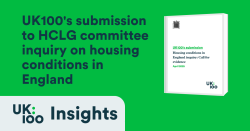UK100 has submitted a response to the Housing, Communities and Local Government Committee's inquiry on housing conditions in England. The submission examines how to improve housing quality and create thriving places with warm homes to live in.
It outlines key priorities for reform:
Supporting local authorities with dedicated funding and enhanced legal powers: Providing ring-fenced funding for councils to recruit and train enforcement officers, with strengthened powers to inspect properties and tackle rogue landlords in the temporary and exempt accommodation sectors.
Addressing poor housing conditions through stronger enforcement: Establishing clear guidance and increased fines for landlords who fail to meet standards, while ensuring local authorities can keep enforcement proceeds to improve housing across their areas.
Ensuring new homes meet high energy efficiency standards: Introducing the Future Homes Standard with zero carbon building standards, strong fabric efficiency, and measuring homes by actual energy use rather than estimates.
Implementing Awaab's Law effectively: Supporting social housing providers to retrofit properties and remove damp and mould, with improved funding delivery through the Warm Homes Social Housing Grant.
Creating warm homes that tackle climate change: Reforming the Energy Performance Certificate system to measure actual energy use and supporting councils to exceed national building standards through local planning powers.
UK100 highlighted several critical recommendations:
- Create dedicated funding streams for councils and community energy umbrella bodies to support local coordination.
- Improve data sharing between local authorities to identify and track rogue landlords across different areas.
- Simplify oversight and reduce administrative burdens on councils delivering retrofit programmes.
- Allow greater flexibility in how Warm Homes funding can be used to support place-based solutions.
- Establish delivery partner groups to provide real-time feedback on retrofit programme implementation.
The submission showcased successful initiatives including Bath and West Community Energy and Plymouth Energy Community, demonstrating how local partnerships can deliver warm homes while supporting local economic and social benefits.
Overall, UK100 called for a transformation in how housing quality is supported and delivered, with local leaders playing a central role in creating thriving places powered by clean energy — with fresh air to breathe, warm homes to live in, and a healthy natural environment.


